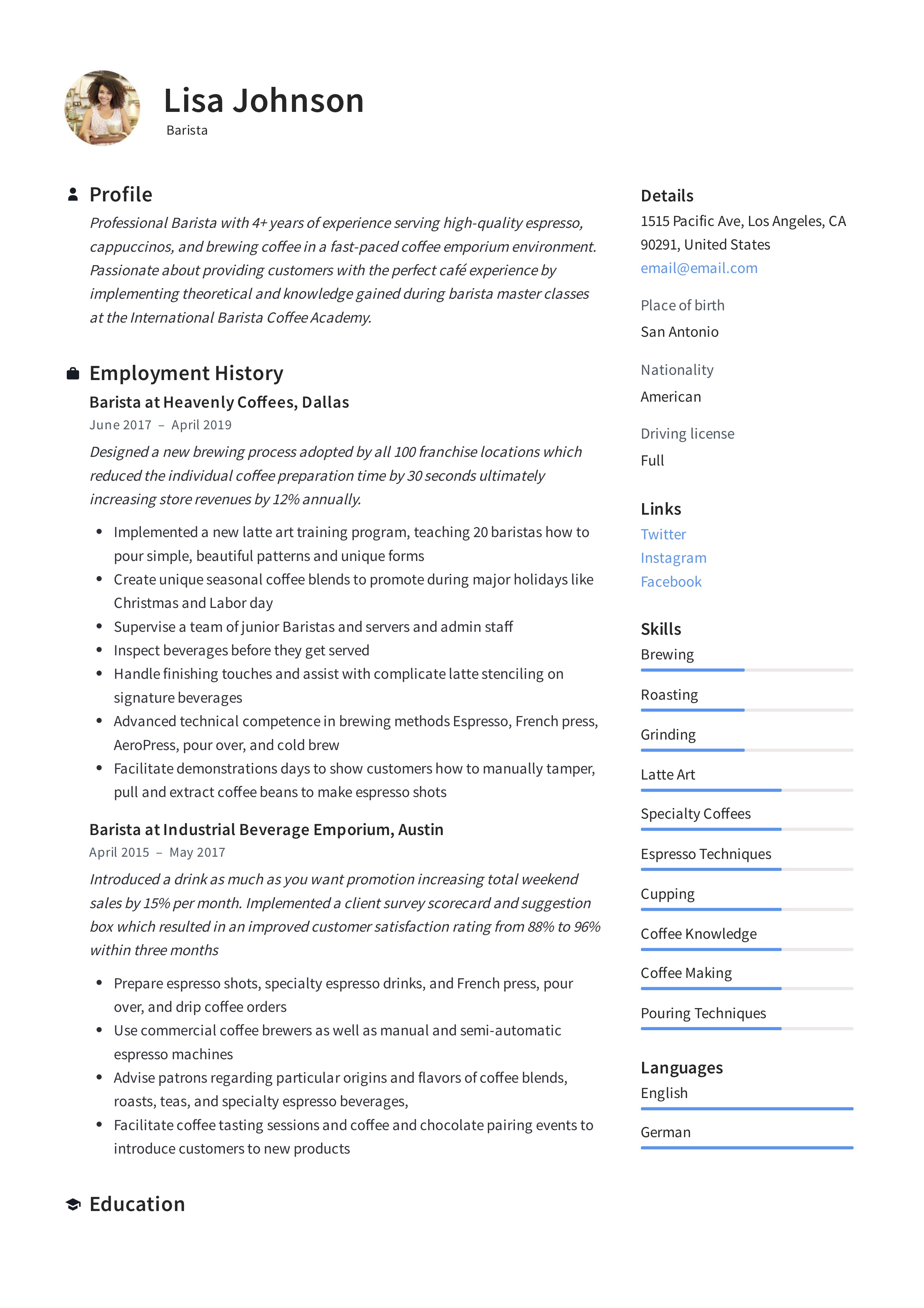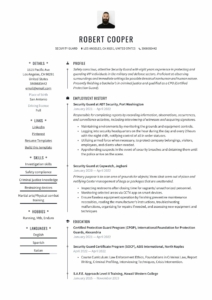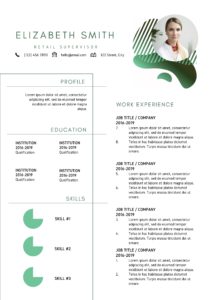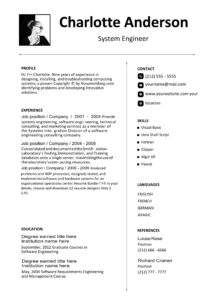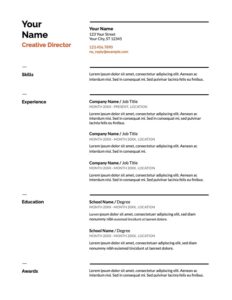A great barista is almost like a skilled technician, for coffee. In this job, you need to under
stand the science behind making the perfect cup of coffee, be a customer magnet and have extensive knowledge of beans, aromas, origins, and blends. When you are on the lookout for a job as a Barista, it is necessary to produce a kick-ass resume for potential employers to distinguish yourself from the competition.
Start by checking out our top-notch Barista resume sample. You want to make sure your resume gets noticed from the rest of the applications by being both informative and entertaining to read, without overwhelming the recruiter or hiring manager with too much information.
Barista Resume & CV Samples
You can download these resume sample in PDF at the bottom of this page, for free!
Or download these examples in PDF at the bottom of this page for free
How-To Make A Barista Resume Guide
Barista Resume Summaries & Objectives
Restaurant, Food and Beverage, and catering managers usually receive many applications for permanent as well as part-time roles. Your resume needs to stand out amongst the applications. Keep your career summary concise and to the point. Add the most important information first to capture their attention while they’re quickly skimming your resume.
Start your career summary with your years of experience in the industry and the main tasks you have performed. When deciding what duties to add, use the job description as your guide. For instance, if the job you are applying emphasizes expertise in Latte Art or the ability to use specialty brewing equipment use those phrases in your resume if you have that type of skill. The more your resume mirrors with the job description of keywords, the better fit you will seem.
Next, Barista’s need to be knowledgable about the different varieties of coffee beans used in the cafe, such as whether they are organic, how they were roasted, and the part of the world they originate from.
Then comes the technical side. Mention whether the coffee machines you can operate are manual, automatic or semi-automatic. There are many different kinds of milk frothing, espresso making, coffee bean grinders, and brewing machinery. List the brand names of the equipment you are familiar with.
| Techniques | Machinery | Experience |
|---|---|---|
| Advanced Latte Art | Stencil & Free-Hand | Four Years |
| Blending Techniques | Manual Grinders & Roasters | Three Years |
| Brewing Methods | Semi-Automatic Espresso Equipment | Three Years |
Example Career Summaries:
'Professional Barista with 4+ years of experience serving high-quality espresso, cappuccinos, and brewing coffee in a fast-paced coffee emporium environment. Passionate about providing customers with the perfect café experience by implementing theoretical and knowledge gained during barista master classes at the International Barista Coffee Academy.'
'Experienced Barista with Guild Level-2 Certification and over a decade of experience in crafting high-quality gourmet coffee drinks in upmarket cafes. Specialized in advanced brewing techniques and latte art and achieved the full Coffee Diploma accreditation with the SCAE (Specialty Coffee Association of Europe).'
'Eager and enthusiastic coffee enthusiast with a knack for effective communication and a passion for learning seeks to embark on a fulfilling journey as a barista at Coffee Unlimited. Excited to blend customer service skills with a love for coffee to contribute positively to the team.'
'Committed and adept in the art of crafting espresso beverages, backed by three years of hands-on experience in customer-centric environments. Pursuing an opportunity to leverage expertise as Lead Barista at Better Latte Cafe, aiming to enhance customer experiences and foster a vibrant coffee culture.'
'Seasoned barista with a wealth of expertise in espresso techniques and diverse coffee brewing methods. Eager to apply five years of proven proficiency in team leadership and meticulous attention to detail to the role of Coffee Manager at Sand Dune Coffee Company, driving excellence in every cup served.'
Barista Job Descriptions, Responsibilities and Duties
A hiring manager would expect to see certain foundational skill sets in your resume application.
An entry-level stage Barista (less than one years’ experience) may:
- Follow recipes to make specialty coffee drinks,
- Use equipment such as automated espresso machines, grinders, roasters, and milk frothers
- Intermediate knowledge of coffee origins, flavor tasting techniques, and bean varieties.
- Take orders from customers and serve hot and cold drinks to patrons
- Clean and sanitize machinery and monitor machine maintenance schedules
A Barista at mid-career stage (2-4 years’ experience) may
- Prepare espresso shots, specialty espresso drinks, and French press, pour over, and drip coffee orders
- Use commercial coffee brewers as well as manual and semi-automatic espresso machines
- Advise patrons regarding particular origins and flavors of coffee blends, roasts, teas, and specialty espresso beverages,
- Facilitate coffee tasting sessions and coffee and chocolate pairing events to introduce customers to new products
A Barista at an experienced stage (4-6 years’ experience) may:
- Implemented a new latte art training program, teaching 20 baristas how to pour simple, beautiful patterns and unique forms
- Create unique seasonal coffee blends to promote during major holidays like Christmas and Labor day
- Supervise a team of junior Baristas and servers and admin staff
- Inspect beverages before they get served
- Handle finishing touches and assist with complicate latte stenciling on signature beverages
- Advanced technical competence in brewing methods Espresso, French press, AeroPress, pour over, and cold brew
- Facilitate demonstrations days to show customers how to manually tamper, pull and extract coffee beans to make espresso shots
Highlight Your Accomplishments
You may be tempted to copy and paste the list of job tasks you performed as detailed in your job description. The drawback to doing this, though, is that you won’t stand out from the other applicants with similar experience.
When listing accomplishments, you need to highlight those aspects that set you apart from the rest of the candidates. What you are most proud of, or what you achieved in your previous roles. Then communicate these through action-packed statements that will grab the reader’s attention.
Examples:
Flat, Simple Duty:
- Take orders and serve coffee beverage to patrons
Accomplishment Statement:
- Prepare and serve over 100 hot and cold beverages per day
Quantifying Your Barista job descriptions
When writing your resume think about providing numeric statements like “How many?” or “How often?” For example:
- What process have you implemented to streamline beverage preparation?
- How did you increase revenue and turnover?
- What was your customer satisfaction rating?
Examples
– Designed a new brewing process adopted by all 100 franchise locations which reduced the individual coffee preparation time by 30 seconds ultimately increasing store revenues by 12% annually.
– Introduced a drink as much as you want promotion increasing total weekend sales by 15% per month.
– Implemented a client survey scorecard and suggestion box which resulted in an improved customer satisfaction rating from 88% to 96% within three months.
Barista Resume Education Section
The education section forms an integral part of your resume. In short, indicate What, Where and When regarding your qualifications, certifications or industry licenses obtained. The name of your qualification, institution, and date of completion is more than sufficient. Unless you are a graduate with limited working experience, there is no need to include major subjects or course curriculum topics.
Barista training schools teach students how to grind and brew coffee as well as prepare various coffee-based and technical knowledge about different types of roasts, growing regions, and grinds. The programs may be one day up to a few months in duration.
Completed High School and Post School education must be listed as follows:
Start with the commencement date and completion date for diplomas, associate degrees, and bachelor degrees. For courses, you can just list the date of completion. Next comes the full name of the qualification, then the full name of the institution and then the City or abbreviated State name.
Use the example below to get you started:
2016 – 2017 Level 2 Certification, Barista Guild of America, San Antonio, TX
2014 – Coffee Shop Manager Training Course, Texas Coffee School, Dallas, TX
2011 – 2013 Basic, Intermediate and Advanced Barista Training, IBCA (International Barista Coffee Academy), Tempe, AZ
2008 – 2010 Bachelor’s Degree in Coffee Consciousness, Cornell Technical College, New York, NY
GPA: 3.8
Majors: Latte Art, Brewing Equipment Fundamentals, Café Management
Minors: Cupping, Palate Development Foundations, Equipment Maintenance
Accolades: IBCA Bursary recipient
Your Barista Resume Skills
Although the coffee making industry requires specific technical skills, employers also consider soft skills. These are the personality traits you have which relate to your fitness as a potential employee who will add value, has adequate knowledge, sufficient experience and will be easy to manage. Incorporate these into your summary and your accomplishment statements.
Technical Skills Examples
- Educational Attainment:
A university degree is not required to become a Barista, but if you want to have a better probability career growth and to secure higher-paying jobs, it is advantageous to have some form of tertiary education. This is especially applicable if your qualification is in a field related to the industry you are pursuing, for example, a Bachelor's in Hotel Management or Certification at the American Barista Guilds Association. - Technical Aptitude:
Baristas need to show excellent knowledge regarding different growing regions, roast profiles and grind types of coffee beans to answer questions from customers. They also have to show competence in various coffee making techniques and steaming activities by being familiar with the equipment, like espresso machines and coffee bean grinders. Operating point of sale systems, order management applications and coffee shop administration are also part of a Barista’s skills set. - Other Technical Skills:
Espresso Techniques, Coffee Bean Grading, Coffee Flavor Profiles, Decaf Processing, Latte Frothers, Recipe Creation, Bean Grinder, Extraction, Specialty Coffees, Latte Art, Cupping, Coffee History, Health and Safety Regulations, Coffee Tasting, Batch Brewing, Pouring Techniques, Roasting Chemistry
Soft Skill Examples
- Attentive
- Team Player
- Reliable
- Hardworking
- Communication
- Independent
- Stress Tolerance
- Stamina
- Personal Hygiene
- Multitasking
- Enthusiastic
- Diplomatic
- Accountable
- Deadline Driven
- Energetic
- Collaborative
- Cooperative
- Customer Service
- Creative
- Detail Orientated
- Multi-Tasking
Qualifications/Certifications associated with Baristas
| SCAE Coffee Diploma | Certificate in Food Service Hygiene | Advanced Certificate in Latte Art |
| Barista Guild of America – Level 2 | SCAE Specialty Coffee Association of Europe Foundation Level | IBCA International Barista Coffee Association Roasting Course |
| Bachelor in Coffee Consciousness | Introductory Diploma in Brewing and Grinding Techniques | Associates Degree Business Management, Hospitality & Tourism Certificate |
Download Barista Resume Examples
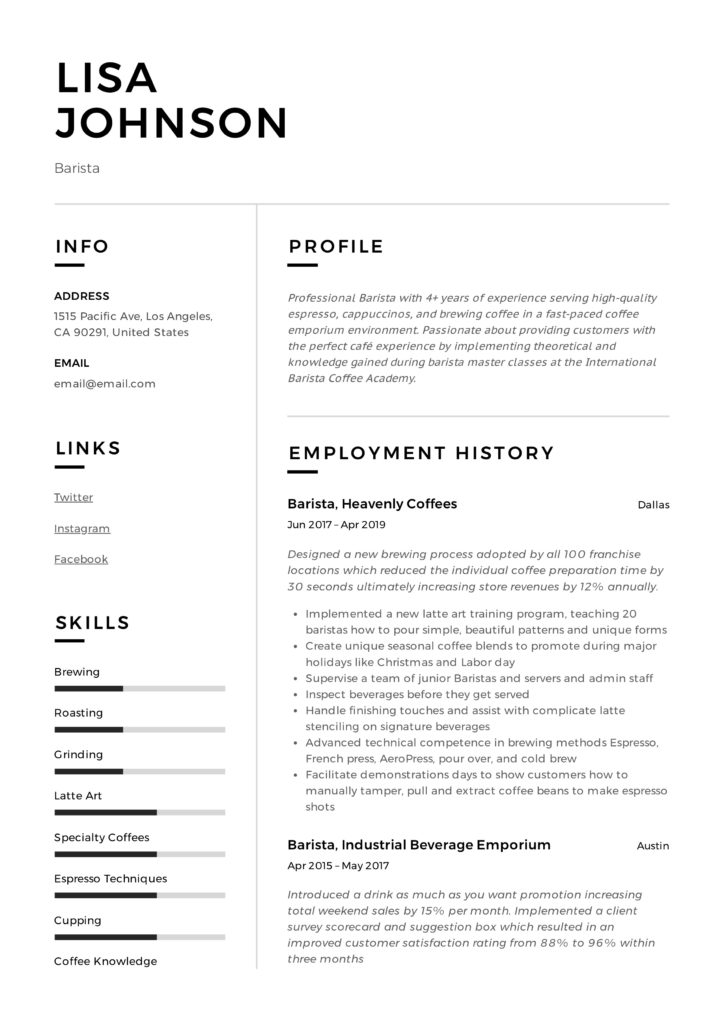
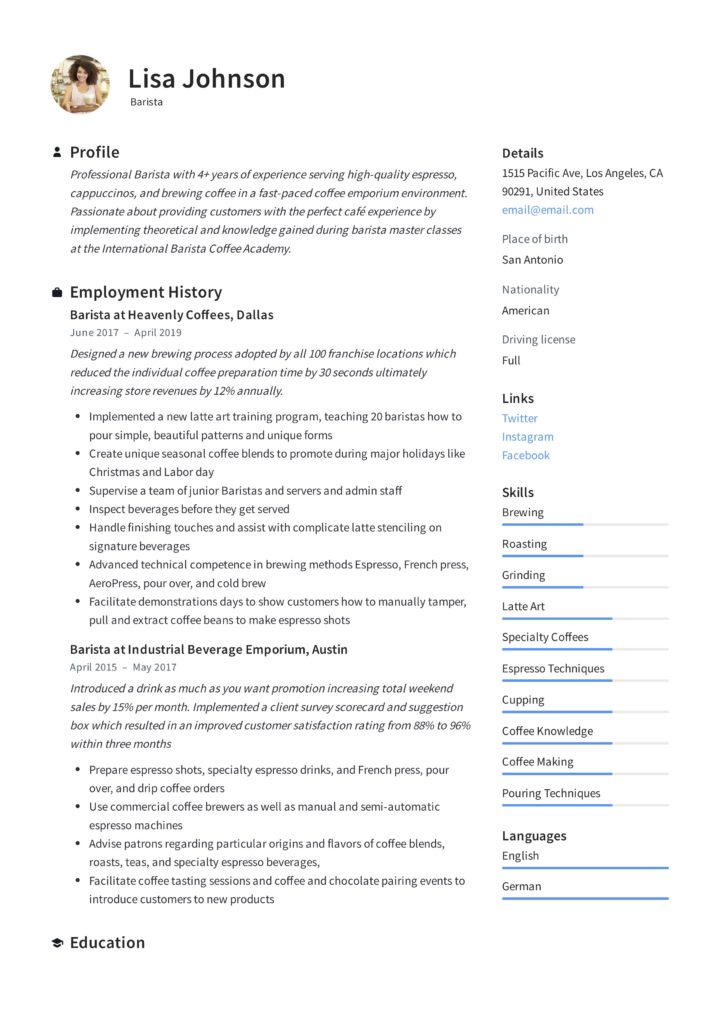
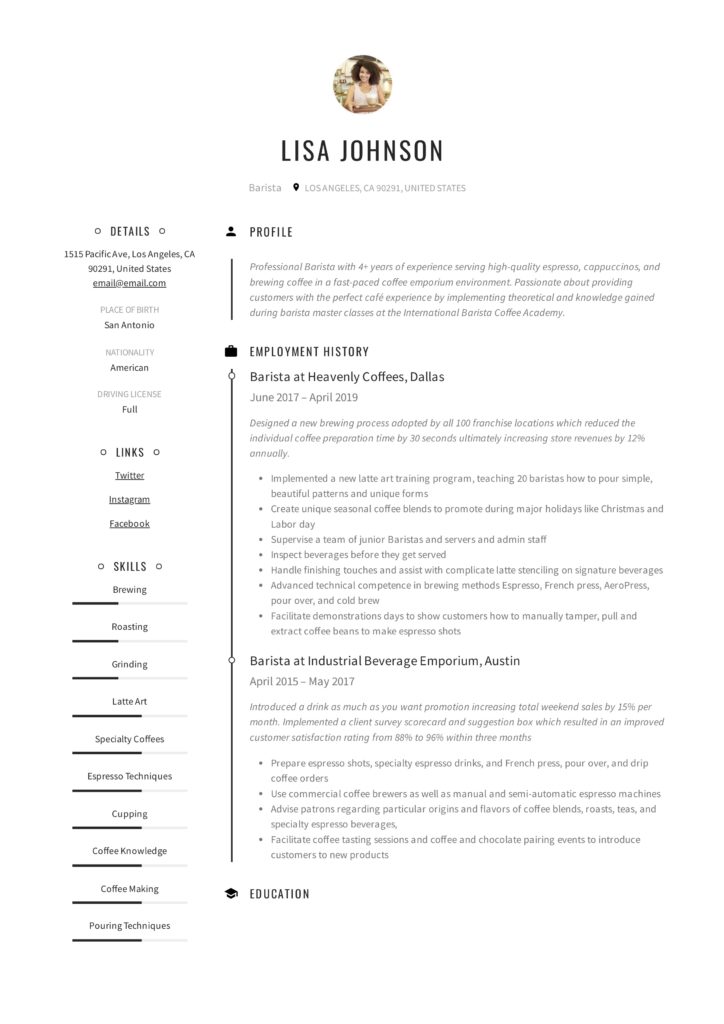
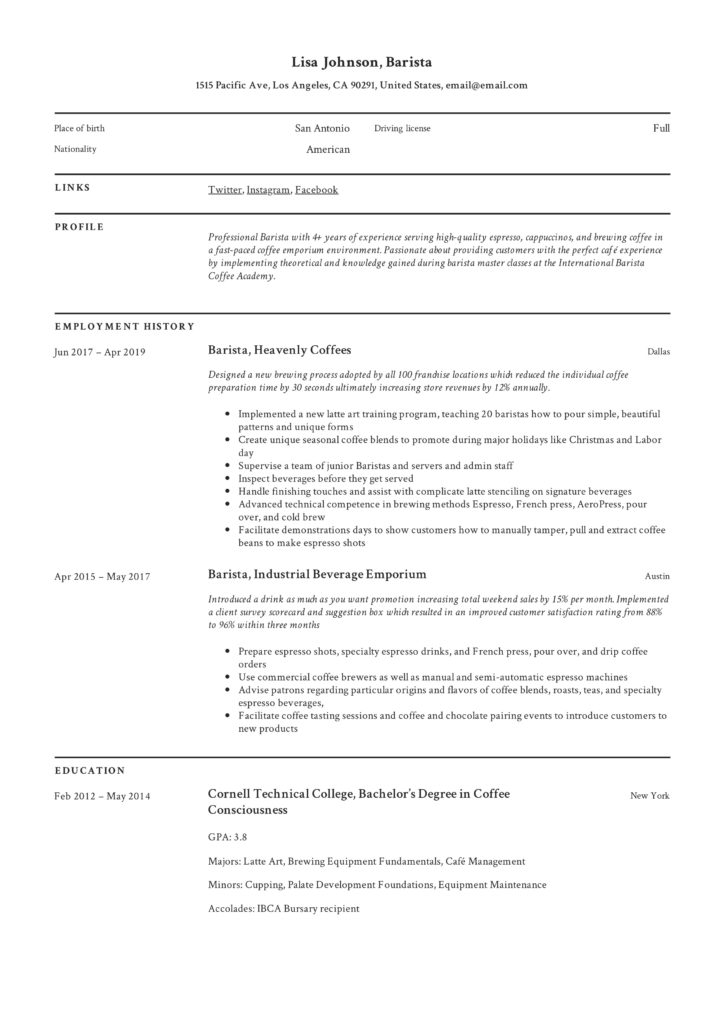
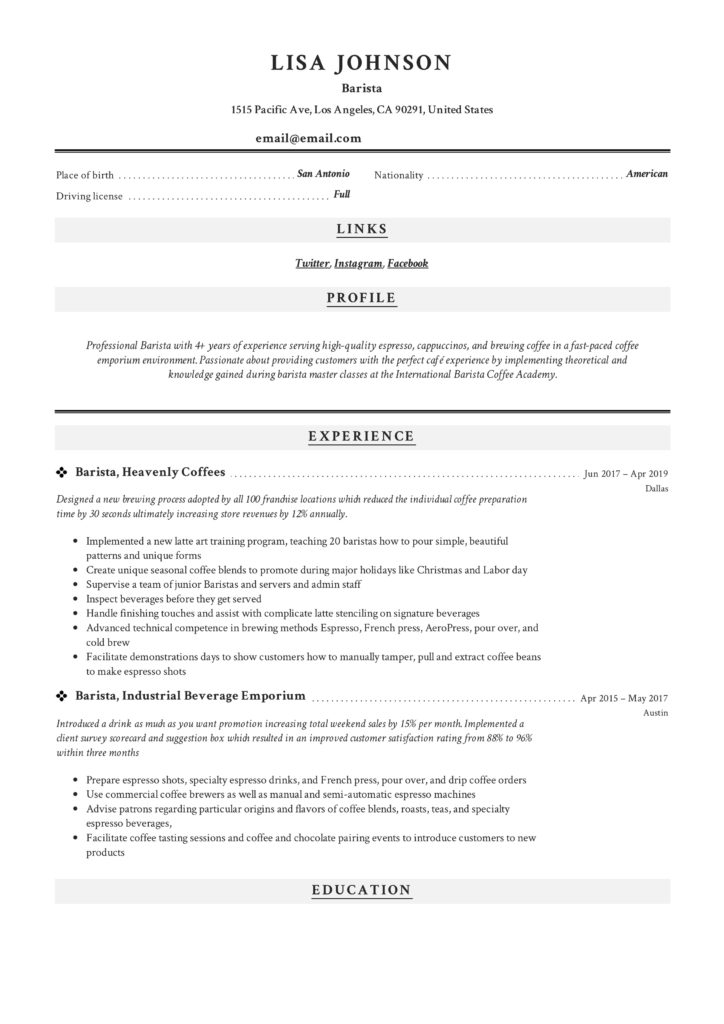
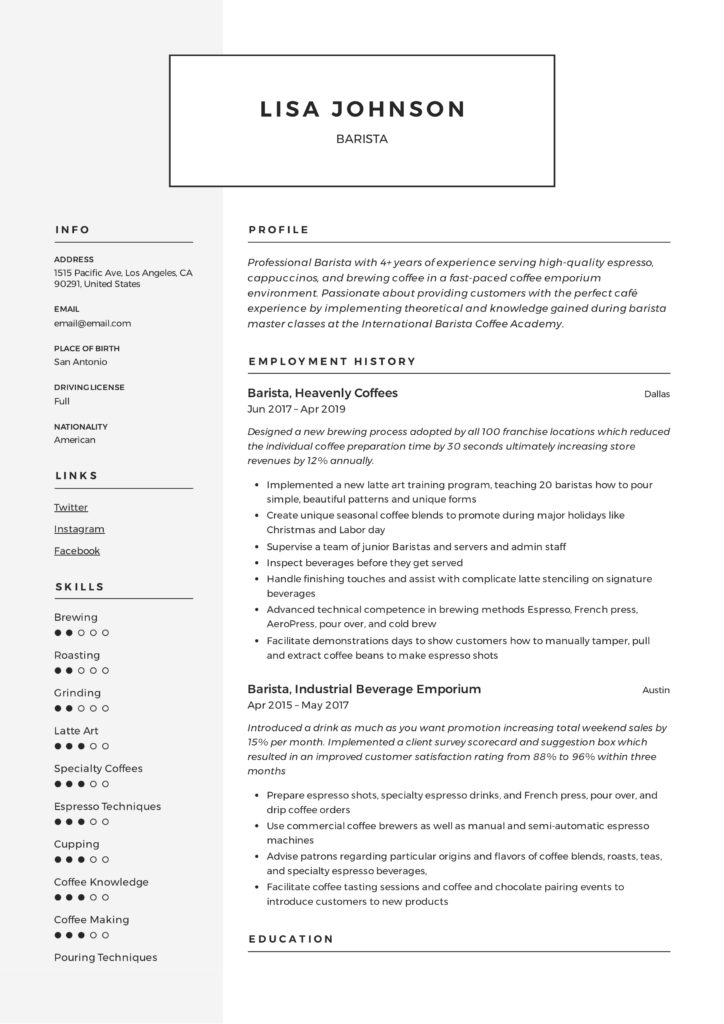
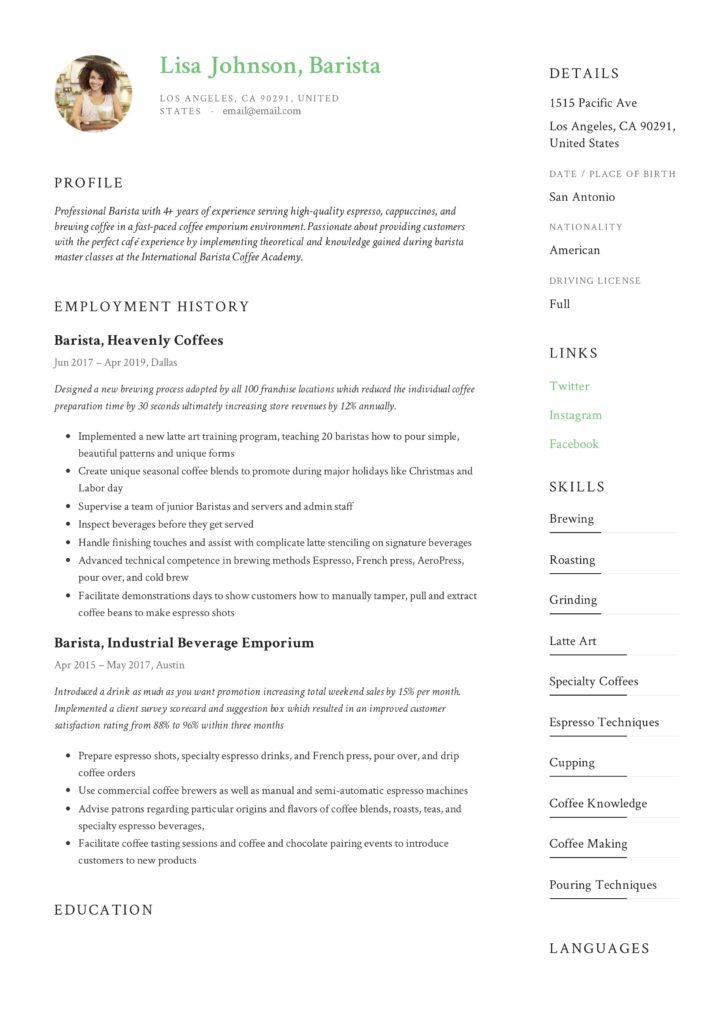
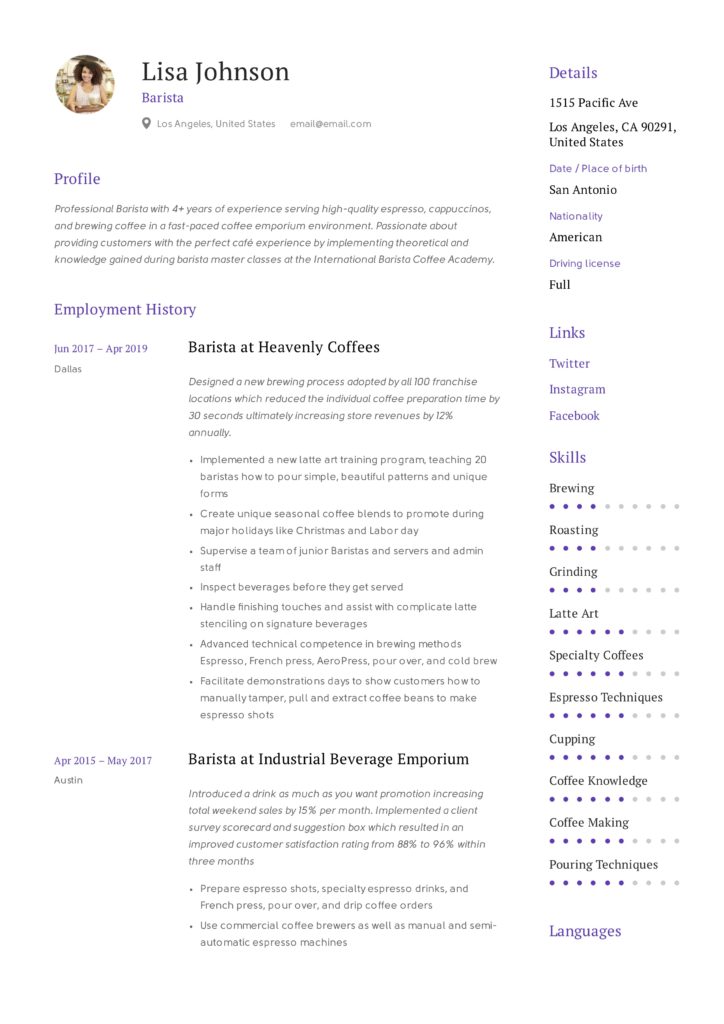
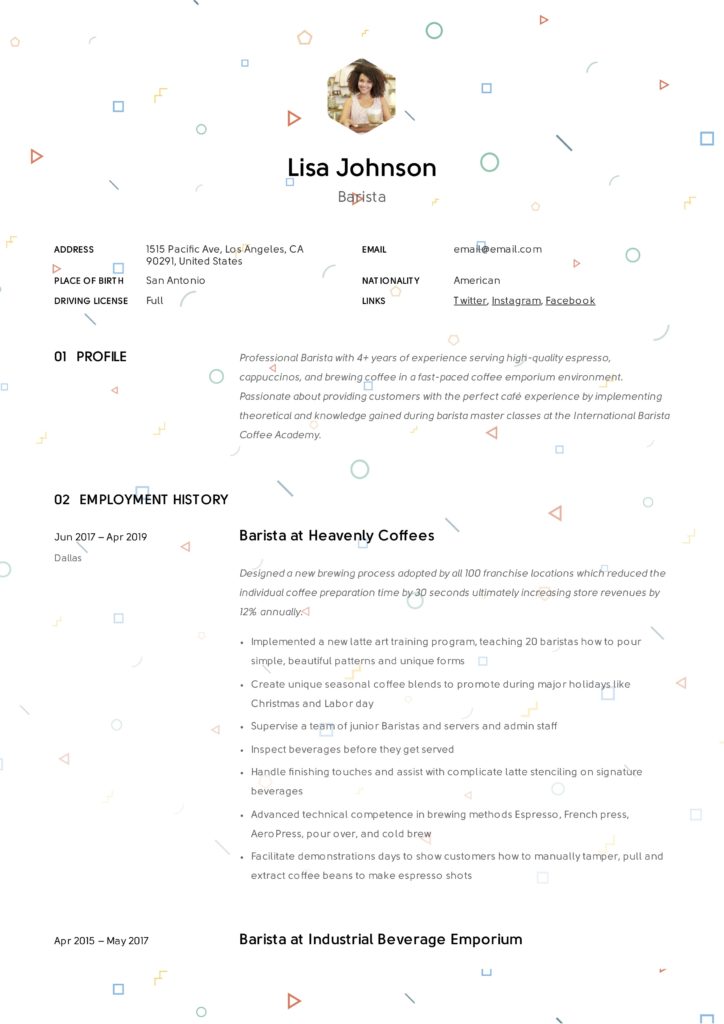
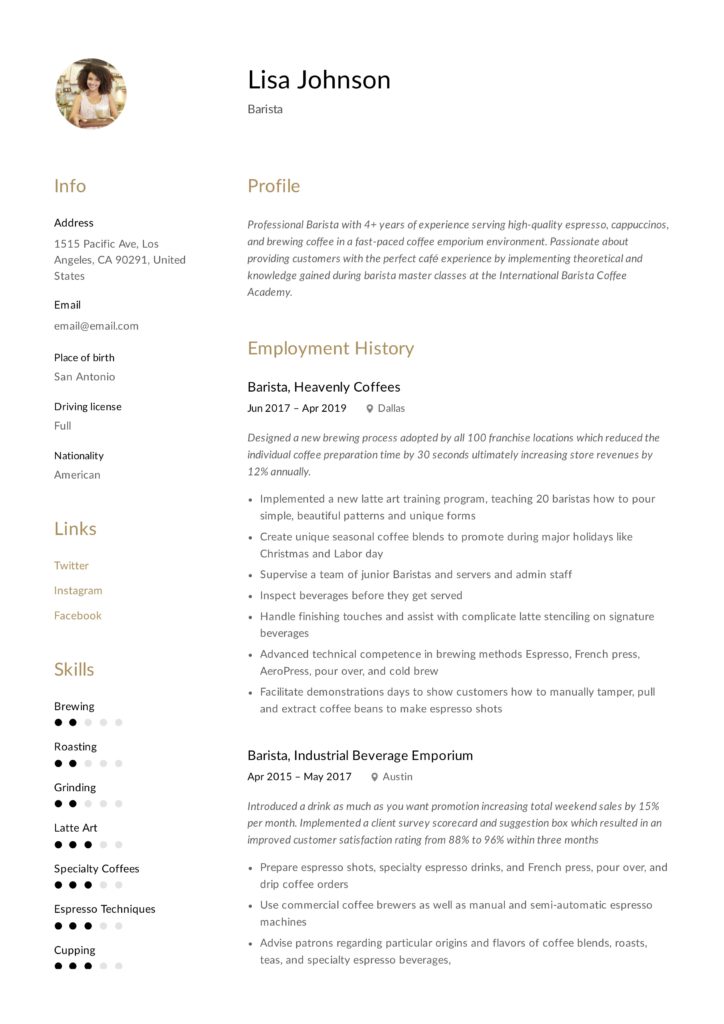
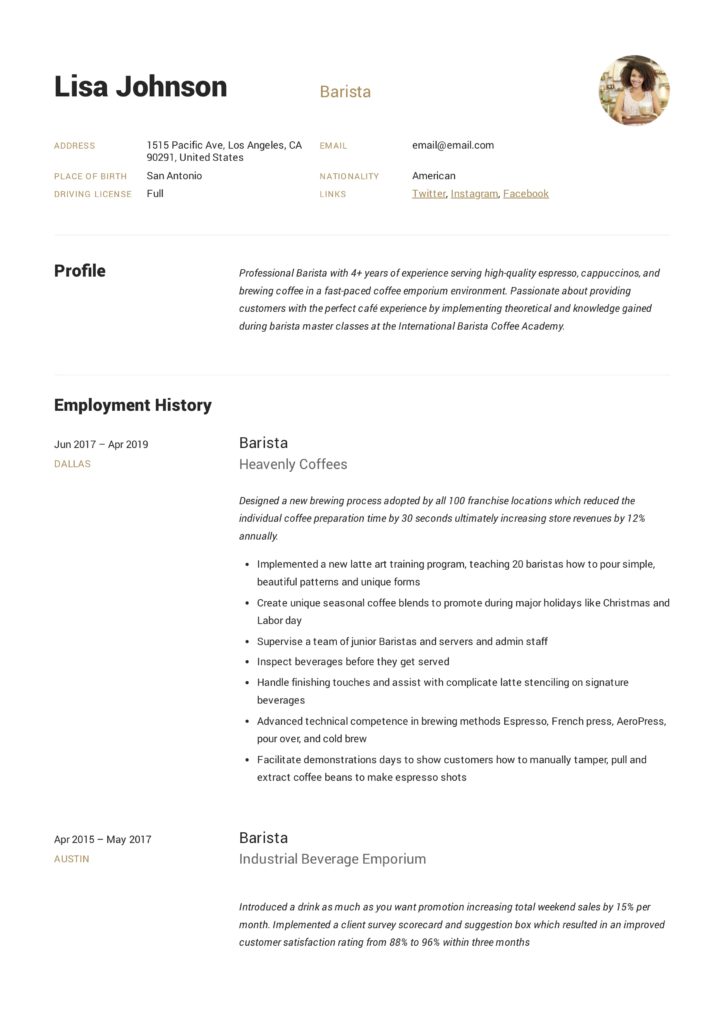
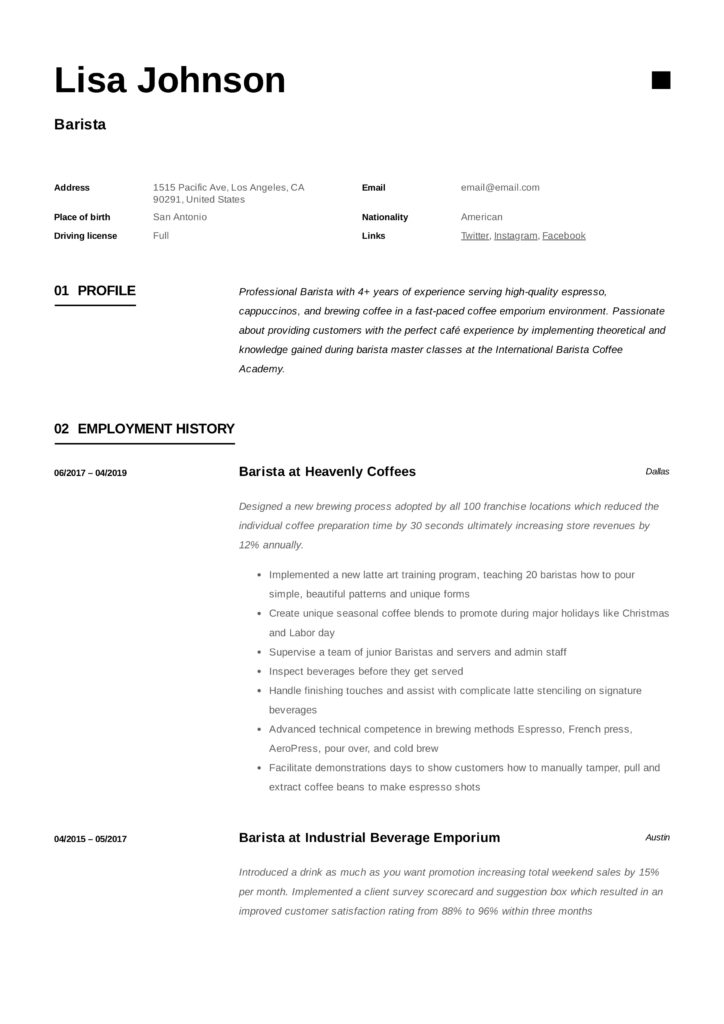
Sources:
